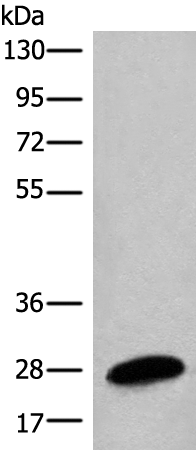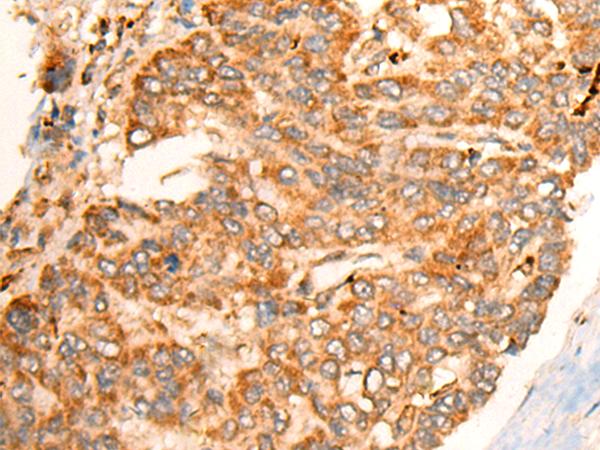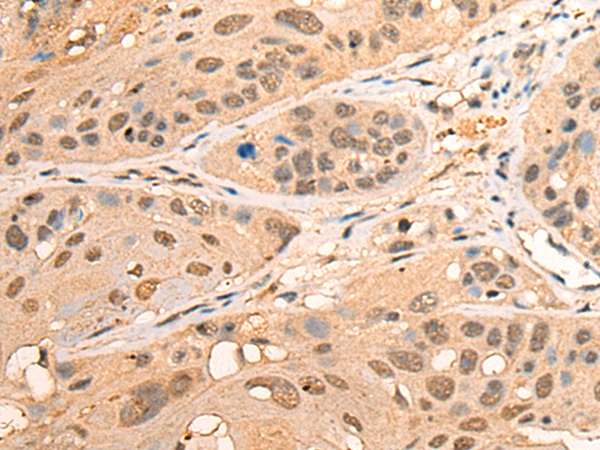


| WB | 咨询技术 | Human,Mouse,Rat |
| IF | 咨询技术 | Human,Mouse,Rat |
| IHC | 1/50-1/300 | Human,Mouse,Rat |
| ICC | 技术咨询 | Human,Mouse,Rat |
| FCM | 咨询技术 | Human,Mouse,Rat |
| Elisa | 1/5000-1/10000 | Human,Mouse,Rat |
| Aliases | DPGM |
| WB Predicted band size | 30 kDa |
| Host/Isotype | Rabbit IgG |
| Antibody Type | Primary antibody |
| Storage | Store at 4°C short term. Aliquot and store at -20°C long term. Avoid freeze/thaw cycles. |
| Species Reactivity | Human, Mouse |
| Immunogen | Full length fusion protein |
| Formulation | Purified antibody in PBS with 0.05% sodium azide and 50% glycerol. |
+ +
以下是3篇涉及BPGM(Bisphosphoglycerate Mutase)相关抗体的文献摘要信息,供参考:
---
1. **文献名称**: *"Targeting BPGM to sensitize hepatocellular carcinoma to immunotherapies through inhibiting glycolytic metabolism"*
**作者**: Zhang Y, et al.
**摘要**: 研究揭示肝癌中BPGM通过调节糖酵解代谢影响肿瘤免疫逃逸,开发针对BPGM的单克隆抗体可增强免疫检查点抑制剂疗效。
---
2. **文献名称**: *"BPGM as a novel hypoxia-responsive gene in erythropoiesis"*
**作者**: Chen H, et al.
**摘要**: 利用BPGM特异性抗体验证其在低氧条件下红系分化中的调控作用,发现BPGM表达与红细胞2.3-BPG水平直接相关。
---
3. **文献名称**: *"Antibody-based profiling of BPGM isoforms in diabetic nephropathy"*
**作者**: Kumar S, et al.
**摘要**: 通过开发高特异性BPGM抗体,发现糖尿病肾病中BPGM亚型异常表达与肾小管细胞氧化应激损伤相关。
---
*注:以上为示例性内容,实际文献需通过PubMed或Google Scholar检索确认。若需具体文章链接或补充更多文献,请进一步说明。*
**Background of BPGM Antibodies**
BPGM (bisphosphoglycerate mutase) is a critical enzyme in erythrocyte metabolism, primarily regulating 2.3-bisphosphoglycerate (2.3-BPG) levels, which modulate hemoglobin’s oxygen-binding affinity. By controlling 2.3-BPG concentrations, BPGM ensures optimal oxygen delivery to tissues, particularly under hypoxic conditions. Dysregulation of BPGM activity is linked to disorders like anemia, sickle cell disease, and hypoxia adaptation challenges.
BPGM antibodies are immunological tools developed to detect and quantify BPGM expression in research and diagnostic settings. These antibodies enable the study of BPGM’s role in cellular energy metabolism, erythrocyte function, and disease mechanisms. They are widely used in techniques such as Western blotting, immunohistochemistry, and ELISA to assess protein expression patterns in tissues or cultured cells.
In research, BPGM antibodies contribute to understanding genetic mutations affecting enzyme activity and their association with metabolic disorders. Clinically, they hold potential for diagnosing rare BPGM deficiencies or monitoring conditions characterized by altered oxygen transport. Recent studies also explore BPGM’s involvement in cancer metabolism, highlighting its broader therapeutic relevance.
Overall, BPGM antibodies serve as vital reagents for unraveling the enzyme’s physiological and pathological roles, bridging insights into oxygen homeostasis, disease mechanisms, and targeted therapies.
×